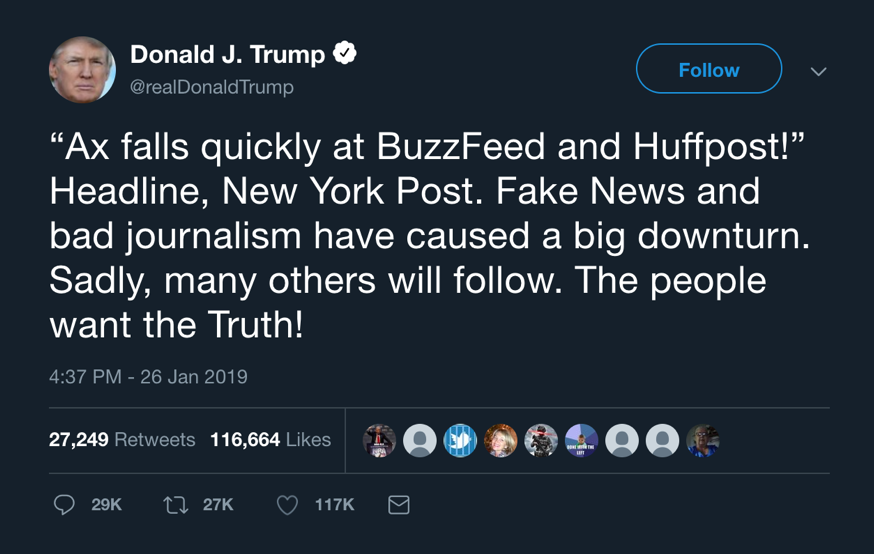US - #WeeklyAddress: January 21 - 27: BuzzFeed and HuffPost journalists harassed online following mass layoffs
Below are the most notable incidents regarding threats to press freedom in the US during the week of January 21 - 27:
BuzzFeed and HuffPost journalists harassed online following mass layoffs
Journalists who announced on social media that they lost their jobs or freelance work as a result of the recent mass layoffs at BuzzFeed and HuffPost received threatening and insulting messages from online trolls and the president himself starting on January 24. President Donald Trump tweeted about the layoffs, which will result in the elimination of significant portions of the newsrooms, on January 26: “Fake News and bad journalism have caused a big downturn.”

Online trolls coordinated their efforts on 4chan, a message board popular among the far right, and inundated journalists with threatening messages, including a meme depicting journalists being lynched that was sent to Huffpost reporter Nick Wing. Under the image read the caption, “JUST KILL THEM. MAKE AMERICA GREAT AGAIN.”
White House, trolls rail against media for coverage of altercation between Native elder and Covington teens
The White House and several online trolls attacked the press for their responses to and coverage of an altercation between a Native elder of the Omaha tribe and a Catholic high school student on January 20 in Washington, DC. On Fox News with Sean Hannity January 22, White House Press Secretary Sarah Huckabee Sanders said she hoped “fake news doesn't become the forever brand of the news media.” The same day, President Trump tweeted his thoughts on the coverage, saying the teens had “become symbols of Fake News and how evil it can be.” Gizmodo Media Group investigative reporter Anna Merlan received threatening emails on January 21 after responding on social media to the incident. The series of emails used violent and threatening language. Merlan mentioned this wasn’t the only death threat she’s received over the last few days.
White House breaks record for longest stint without press briefing
Prior to a January 28 briefing, Press Secretary Sarah Huckabee Sanders had not briefed the press in 41 days—since December 18—exceeding the administration’s previous record of 29 days without a briefing. President Donald Trump tweeted on January 22 that he told Sanders “not to bother” giving press briefings anymore because “the press covers her so rudely & inaccurately.” Over the past 41 days, Sanders had also broken the record for the longest span without on-camera briefings since they were first introduced under the Clinton administration. President Trump did, however, speak to journalists briefly in West Wing driveway gaggles question-and-answer sessions during this period. The length and quantity of White House press briefings have seen a consistent decrease throughout the Trump presidency. From January to June 2018, the average length of press briefings declined from 30 minutes andto just under 17 minutes, with the December 18 press briefing lasting just more than 15 minutes.
Colorado law enforcement agencies encrypt radio communications
Journalists are concerned that a decision that has encrypted all radio communications for more than two dozen Colorado law enforcement agencies will impede their ability to report on crime and police activity. Officials told the Columbia Journalism Review (CJR) that encrypting the radio communications is essential for keeping the officers working effectively and the public safe, also citing misinformation as a concern. Encrypting all radio communications, however, makes it harder to cover crime as journalists often use the traffic to learn about and respond to breaking news. “If you’ve ever worked in a newsroom, you know how important the police scanner is to covering a community,” Chip Stewart, a media law professor at Texas Christian University, told CJR. “You can’t get out to cover something if you don’t know it’s happening.” In 2018, a member of the Colorado House of Representatives introduced House Bill 18-1061 intended to block law enforcement agencies from using encryption, except if required for tactical and investigative purposes. The bill failed to make it out of committee, but has a chance to be reintroduced this year.
The United States ranks 45th out of 180 countries in RSF's 2018 World Press Freedom Index.
For the latest updates, follow RSF on twitter @RSF_en.



